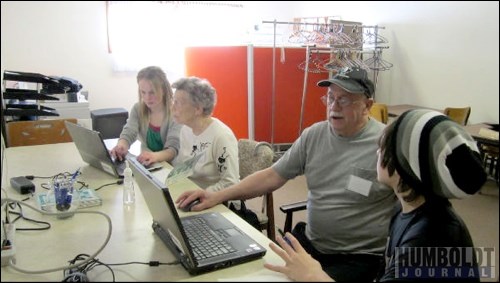It was a meeting of the minds that bridged the generation gap.
Recently, a dozen or so seniors from the Humboldt Senior Citizens Club learned how to use computers through a computer-mentoring program put into place by the club's coordinator, Glenda Frey. The idea was to help them discover and learn how to use communication tools, such as email or Skype, or any programs that might be of interest to them.
To be able to start the program, the Seniors Club needed some computers. So back in December, Frey sent out an email to businesses in Humboldt, looking for anyone who could donate a used laptop for the program that she wanted to get underway in January.
"We are extremely grateful for two donated laptops," Frey said. "One brand new laptop was donated from Yuen's shortly before Christmas, and a second gently used laptop plus a regular desktop computer was donated by PIER."
Once the equipment was in place, it was just a question of finding students who would be willing to come in and donate their time to help the seniors learn to use them.
She found that with some of the Grade 8 students at St. Augustine School who showed an interest in taking on the role of teachers.
Every Tuesday for about six weeks, a half-dozen students were brought to the hall during their lunch hour to work with the seniors.
"The way I started them out was I had the students say what they do on the internet," explained Frey. "Then I had the seniors say what they do on the internet, and if they didn't do anything, the students needed to know that. So then we tried to match them accordingly."
It was a case of the young mentoring the old, and it turned out to be a win-win situation all around.
"The students were wonderful, they were absolutely wonderful," said June Anweiler, who had never touched a computer before participating in the mentorship program. "They were very patient, very understanding, and it was great working with them."
Anweiler was paired with Morgan Lueke, who thought her "senior" caught on really quickly, considering she'd had no experience with computers before.
"She didn't really have any experience to start with, and so we got her email account set up," said Lueke. "That's all she really wanted to learn. We worked on sending and receiving emails, opening them up. "
Fred Coueslan, who has a computer at home and knows some of the basics already, said he thought the kids were terrific. Coueslan was more interested in an "upgrade" to his abilities, such as learning how to set up and use Skype, and the idea of helping him with that appealed to Braeden Crooks, who became his mentor.
"It made it easier for me because he already knew stuff," the young boy said, "but he also wanted to learn or get into more things than the other seniors, so that's where the challenge came in."
Both Anweiler and Coueslan said how much they enjoyed just being with the young kids for that hour every week.
"I enjoyed that more than I did anything else," admitted Anweiler. "Just being with the kids, being accepted by them. They were so good."
The experience was equally good for the mentors, according to Lueke and Crooks. Both students said they would do it again, and that they would recommend participating in this program to other students next year.
"They liked being around the different age group," Lueke said about the seniors. "A lot of them aren't in contact with their grandkids, so they don't get to be around this age group."
"I wish we'd had more time with them," said Crooks at the end of the interview.

.png;w=120;h=80;mode=crop)

.png;w=120;h=80;mode=crop)
